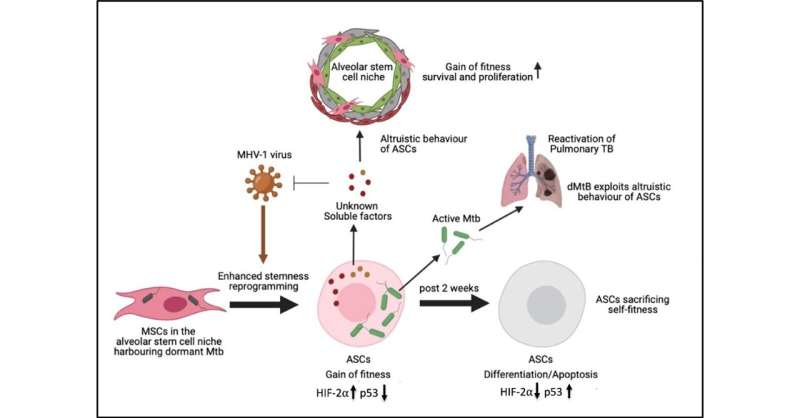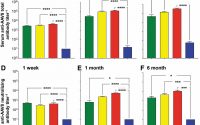Stem cells may hold a key to developing new vaccines against COVID-19

The SARS-CoV-2 virus that causes COVID-19 may have the ability to reactivate dormant tuberculosis (TB). In a novel study, scientists report in The American Journal of Pathology that infection with a specific coronavirus strain reactivated dormant Mycobacterium tuberculosis (MTB) in mice. This knowledge may help to develop new vaccines for COVID-19 and avoid a potential global tuberculosis epidemic.
The COVID-19 pandemic caused by the SARS-CoV-2 virus demonstrates the ability of an emerging virus to affect masses, and strain and disrupt the workings of modern healthcare systems around the world. A significant number of infected COVID-19 individuals have recovered. However, a possible host defense or antiviral mechanism against the virus is yet to be identified. There are concerns that in the long-term, the virus might activate dormant bacterial infections such as TB in select infected individuals, as alarmingly, TB is already present in one quarter of the world population. Viral infections such as the influenza virus or SARS-CoV-1 are known to cause transient immune suppression that leads to reactivation of dormant bacterial infection. The highest death rate during the Spanish flu pandemic of 1918 was in patients with TB, and patients with TB or multidrug-resistant TB had a worse prognosis than others during the influenza A (H1N1) pandemic in 2009.
“There is an urgent need to study the association of COVID-19 with dormant TB reactivation to avoid a potential global TB pandemic,” explained lead investigator Bikul Das, MD, Ph.D., Department of Stem Cell and Infectious Diseases, KaviKrishna Laboratory, Guwahati Biotech Park, Indian Institute of Technology, Guwahati, India; and Department of Stem Cell and Infection, Thoreau Lab for Global Health, University of Massachusetts, Lowell, MA, U.S.. “It is important to understand the host defense mechanism against this disease to develop a better vaccine and/or treatment. We therefore postulated that, similar to bacteria, adult stem cells may also exhibit an altruistic defense mechanism to protect their niche against external threat.”
Investigators studied the coronavirus strain murine hepatitis virus-1 (MHV-1) infection in the lung in a mouse model (dMtb) of mesenchymal stem cell (MSC)-mediated MTB dormancy. This showed 20-fold lower viral loads than the dMtb-free control mice by the third week of viral infection and a six-fold increase of altruistic stem cells (ASCs), thereby enhancing the defense. Tuberculosis was reactivated in the dMtb mice, suggesting that dormant TB bacteria hijack these ASCs to replicate in the lung to cause pulmonary TB. Results suggest that these ASCs are transient (they expand for two weeks and then undergo apoptosis or cellular suicide) and exhibit antiviral activities against MHV-1 by secreting soluble factors.
Source: Read Full Article


